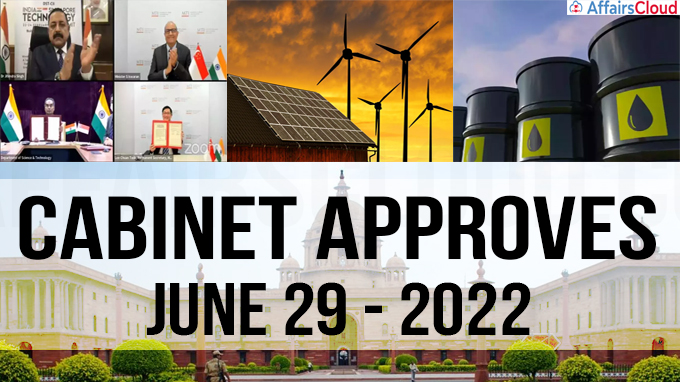
On June 29, 2022, the Union Cabinet chaired by the Prime Minister (PM) of India Narendra Modi has approved the following proposals which were detailed by Union Minister Anurag Singh Thakur, Ministry of Information and Broadcasting (MIB):
- MoU between DST, India and MTI, Singapore on Cooperation in the fields of Science, Technology and Innovation
- Strategic Partnership Agreement between the MNRE, India and IRENA
- Categorization of the CDRI as an International Organization & signing of HQA with CDRI for granting it immunities under UN (Privileges & Immunities) Act, 1947
- Deregulation of Sale of Domestically Produced Crude Oil
- Computerization of Primary Agriculture Credit Societies (PACS)
Cabinet approves MoU between DST, India and MTI, Singapore on Cooperation in the fields of Science, Technology and Innovation
The Union Cabinet has approved the Memorandum of Understanding (MoU) signed between the Department of Science and Technology (DST) under the Indian Ministry of Science & Technology; and the Ministry of Trade and Industry (MTI) of the Government of the Republic of Singapore on Cooperation in the fields of Science, Technology and Innovation.
Objective:
To encourage, develop and facilitate cooperation in fields of common interest in science, technology and innovation.
What is in the MoU?
i.To promote innovation and entrepreneurship through collaboration within any area of mutual interest to create new technology creation, manpower training, and IP (Internet Protocol) generation. This include
- Agriculture and food science and technology;
- Advanced manufacturing and engineering;
- Green economy, energy, water, climate and natural resources;
- Data science, Emerging Technologies;
- Advanced Materials; and
- Health and biotechnology.
- Other areas of common interest will be included through mutual consent.
ii.Activities implemented under this cooperation will provide impetus to Atmanirbhar Bharat which include product development and technology exchange.
Cabinet approves Strategic Partnership Agreement between the MNRE, India and IRENA
The Union Cabinet also approved the Strategic Partnership Agreement signed between the Ministry of New and Renewable Energy (MNRE), Government of India and the International Renewable Energy Agency (IRENA) to help India’s energy transition efforts, and the world in combating climate change.
What is in the agreement?
It will support India in achieving its ambitious target of 500 GW (Giga Watt) of installed non-fossil fuel electricity capacity by 2030 which will further promote Atmanirbhar Bharat. It also includes enhanced cooperation in the following areas:
- Facilitating knowledge sharing from India on scaling-up renewable energy and clean energy technologies
- Supporting India’s efforts on long term energy planning
- Collaborating to strengthen the innovation climate in India
- Moving towards cost-effective decarbonization through catalyzing development and deployment of green hydrogen
Cabinet approves Categorization of the CDRI as an International Organization & signing of HQAwith CDRI for granting it immunities under UN (Privileges & Immunities) Act, 1947
The Cabinet has approved the categorization of the Coalition for Disaster Resilient Infrastructure (CDRI) as an ‘International Organization’ and signing of the Headquarters Agreement (HQA) with CDRI for granting it the exemptions, immunities and privileges as per the United Nations (Privileges & Immunities) Act, 1947.
- This approval will provide CDRI an independent and international legal identity for carrying out functions efficiently and effectively, internationally.
Key Benefits of MoU to CDRI:
i.Deputing experts to other countries, that are particularly vulnerable to disaster risk and / or require support for post disaster recovery and vice-versa.
ii.Deploying funds globally and receive contributions from member countries for activities
iii.Rendering all possible support to member countries in upgrading their systems to ensure disaster and climate resilience of existing and future infrastructure, while aligning with the Sustainable Development Goals (SDGs), the Paris Climate Agreement and the Sendai Framework for Disaster Risk Reduction;
iv.Utliizing international engagement to foster disaster resilient infrastructure at home; and, providing Indian scientific and technical institution as well as infrastructure developers an opportunity to interact with global experts.
About Coalition for Disaster Resilient Infrastructure (CDRI):
Set up in 2019 by the Central Government with a support of Rs. 480 crore, it is based in New Delhi, Delhi. CDRI uses this amount to fund technical assistance and research projects on an ongoing basis, setting up the Secretariat office and covering recurring expenditures over a period of 5 years from 2019-20 to 2023-24.
- It was launched by Indian PM during the United Nations (UN) Climate Action Summit in September 2019 at New York, United States (US).
- Since its launch, 31 Countries, 6 International Organizations 2private sector organizations have joined as members of CDRI.
It is a global partnership of National Governments, UN agencies and programs, multilateral development banks and financing mechanisms, the private sector, academic and knowledge institutions that aims to promote the resilience of infrastructure systems to climate and disaster risks, thereby ensuring sustainable development.
Cabinet approves Deregulation of Sale of Domestically Produced Crude Oil
The Cabinet Committee on Economic Affairs (CCEA), chaired by PM Narendra Modi has approved ‘Deregulation of Sale of Domestically Produced Crude Oil’, whereby Government has decided to cease allocation of crude oil and condensate w.e.f. October 1, 2022.
- In this regard, the condition in the Production Sharing Contracts (PSCs) to sell crude oil to Government or its Nominee or Government Companies will be waived off.
- However, Government revenues like Royalty, cess, etc. will continue to be calculated on uniform basis across all Contracts, and the ban on export on crude oil will also continue.
Benefits:
i.This will ensure marketing freedom for all Exploration and Production (E&P) operators i.e. they can sell locally produced crude oil to any Indian refinery for turning it into fuel, such as petrol and diesel. They can sell to anyone offering the most price in an e-auction.
- For example– Oil and Natural Gas Corporation (ONGC) can auction its 13-14 million tonnes a year of crude oil produced from Mumbai High field to any refiner, including private sector Reliance Industries Ltd and Rosneft-backed Nayara Energy.
ii.It will further spur economic activities, incentivize making investments in upstream oil and gas sector.
Current Scenario:
The government fixes the quantity each buyer will pick. This limits the scope for price negotiations and often sellers sold oil at discount.
Cabinet approves Computerization of Primary Agriculture Credit Societies (PACS)
The CCEA also approved the computerization of about 63,000 functional Primary Agricultural Credit Societies (PACS) with a budgetary outlay of Rs 2,516 crore over a period of 5 years. Out of the total budget, the GoI share is Rs 1,528 crore. This will bring PACS on a common platform at National level and have a Common Accounting System (CAS) for their day to day business
Benefits:
i.It will increase the efficiency and diversification of PACS by bringing transparency and accountability in their operations.
ii.Each PACS will get around Rs 4 lakh to upgrade its capacity and even old accounting records will be digitized and linked to a cloud based software.
iii.It will also benefit about 13 crore small and marginal farmers.
What will be done under this?
i.There will be development of cloud based common software with cyber security and data storage, providing hardware support to the PACS, digitization of existing records including maintenance support and training.
- This software will be in vernacular language having flexibility of customization.
ii.Project Management Units (PMUs) will be set up at central and state levels.
iii.District Level Support will also be provided at cluster of about 200 PACS.
iv.In the case of states where computerization of PACS has been completed, Rs 50,000 per PACS will be reimbursed provided they agree to integrate with or adopt the common software
v.It will also help PACS to become a nodal center for providing various services such as Direct Benefit Transfer (DBT), Interest Subvention Scheme (ISS), Crop Insurance Scheme (PMFBY) and inputs like fertilizers and seeds.
About Primary Agricultural Cooperative credit societies (PACS):
They constitute the lowest tier of the India’s three-tier short-term cooperative credit (STCC) comprising of around 13 crore farmers as its members. PACS account for 41% (3.01 crore farmers) of the Kisan credit card (KCC) loans given by all entities in the country and 95% of these KCC loans (2.95 crore farmers) through PACS are to the small and marginal farmers.
- The other two tiers viz. State Cooperative Banks (StCBs) and District Central Cooperative Banks (DCCBs) have already been automated and brought on Common Banking Software (CBS).
Recent Related News:
i.The Union Cabinet approved USD 808 million (Rs 6,062.45 crore) for a new World Bank (WB) assisted scheme ‘Raising and Accelerating MSME Performance (RAMP)’ which will probably be initiated in FY23 to directly or indirectly benefit all 63 million MSMEs.
ii.CCEA extended the time limit for 10 power projects by 36 months to 156 months instead of 120 months from the date of import. This will enable the power projects to furnish documents required to become certified mega projects in order to competitively bid for future PPAs (Power Purchase Agreements) and get tax exemptions as per policy terms.




